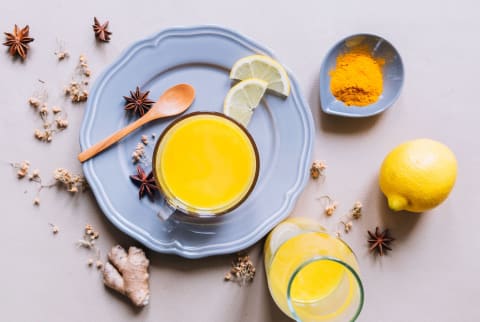
Image by Nataša Mandić / Stocksy
March 2, 2023
The word “superfood” is often overused, but if there ever was a list of truly super foods, ginger would be close to the top. This plant root has shown a wide range of health benefits, and now, a new study1 demonstrated that it can kickstart your immune system against infection.
Advertisement
This ad is displayed using third party content and we do not control its accessibility features.
New study on ginger and the immune system.
Have you noticed lately that ginger is all over the place? It’s in our smoothies, juices, tonics, cocktails, supplements, and so much more. Researchers from the Leibniz Institute in Germany also noticed that ginger seems to be everywhere, and that many people are praising its health benefits, including its anti-nausea, anti-inflammatory, and antioxidant properties.
The German Federal Statistical Office confirmed the researchers’ hunch; the use of ginger has almost quadrupled in the country over the last decade. With this in mind, they set out to answer the question: Can consuming small amounts of ginger, like those found in foods, be enough to reap its health benefits?
To find the answer, the researchers leaned on previous research, which tells us that a significant amount of the beneficial compounds in ginger—most importantly, the compound gingerol, which activates the spice receptors on the tongue—enters the blood about 30 to 60 minutes after drinking a liter of ginger tea.
Gingerol acts similarly to some of the compounds in chili peppers and acts on a receptor called TRPV1, which is found on the surface of nerve cells. It’s also suspected that this same receptor is found on white blood cells, which are the immune cells largely responsible for fighting invasive bacteria. This is what the researchers decided to dig into further.
Can ginger help fight infection?
The results showed that TRPV1 was present on white blood cells, and that consuming ginger can lead to changes in the activity of these cells due to gingerol’s effect on TRPV1 receptors. The study showed that even a low concentration of gingerol in the blood can put these white blood cells on heightened alert, which makes them more effective at fighting bacteria. In fact, the study showed that these cells were more than 30% more effective at responding to a bacterial thread.
So what does all this mean? It means that when someone says “drinking ginger tea is good for immunity,” science actually backs that up. The study showed that drinking less than a liter of ginger tea can cause measurable differences in immune cell activity in ways that help us fight infection.
Gabby Anderson, PhD, the lead author of the study, explained in a news release, “…our results support the assumption that the intake of common amounts of ginger may be sufficient to modulate cellular responses of the immune system.” That said, this is still a very preliminary study, so as Veronika Somoza, another study author, noted, “…there are still many unanswered questions at the molecular, epidemiological, and medical levels that need to be addressed with the help of modern food and health research.”
Advertisement
This ad is displayed using third party content and we do not control its accessibility features.
Science-backed ways to boost immunity.
If you’re looking for a more targeted way to reap the immune-supporting perks of ginger, you can also take a supplement that includes the ingredient. Look for one that contains high amounts of the main bioactive, gingerol, for maximum benefit. Ginger has also been found to have complimentary benefits when combined with another functional food, turmeric. Here are some of our favorite supplements for immunity at mindbodygreen—a few of which contain these powerful ingredients.
As for other science-backed ways to support immunity, when it comes to fending off infections like the common cold or flu, sleep is critical. How? According to integrative immunologist Heather Moday, MD, our immune system is directly connected to our sleep-wake cycle. Endless studies point to the connection, too. In one example, a study2 with 53 participants found that those with shorter sleep duration in the weeks leading up to exposure to a rhinovirus were less likely to be resistant to the illness.
And while it’s good to rest if you’re already sick, getting regular exercise on the other days can help boost immunity. A 2019 study3 showed that moderate exercise mobilizes immune cells, and that those who exercise have lower levels of inflammation and get sick less often.
The takeaway.
Advertisement
This ad is displayed using third party content and we do not control its accessibility features.

